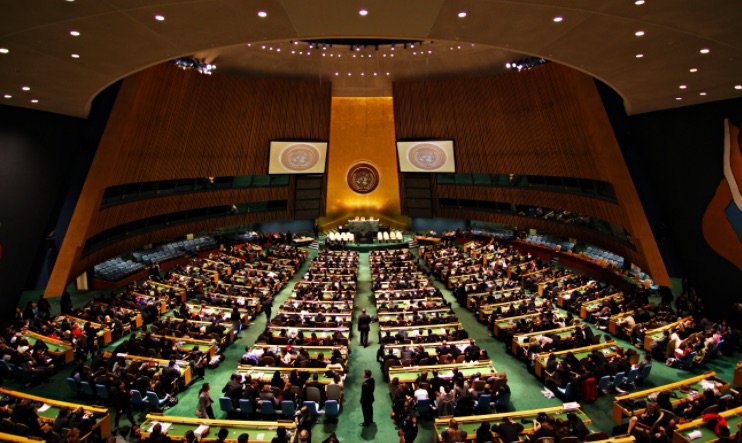FREE FLOW OF INFORMATION
A press release from the United Nations
The General Assembly capped its high-level debate on peacebuilding and sustaining peace today [April 26] with a consensus resolution welcoming the Secretary-General’s January 2018 report on those activities and deciding to further discuss his recommendations to address existing gaps.

Adoption of the text, titled “Follow-up to the report of the Secretary-General on peacebuilding and sustaining peace”, coincides with the passage of a similar one in the Security Council (please see Press Release SC/13319), both encouraging action by Member States and the United Nations to implement the “twin” sustaining peace resolutions of 2016.
By its terms, the Assembly invited the relevant United Nations bodies and organs — including the Peacebuilding Commission — to further advance, explore and consider implementation of the report’s recommendations and options during its current and upcoming sessions.
By other terms, the 193-member body requested the Secretary-General to present, during its seventy-third session, an interim report elaborating on his recommendations and options, including for financing United Nations peacebuilding activities.
During the seventy-fourth session, he was requested to submit a report in connection with the next comprehensive review of the United Nations peacebuilding architecture, focusing on continued implementation of resolution 70/262 and progress in the implementation of his recommendations and options contained in his report (document A/72/707-S/2018/43).
Throughout the day, delegates commended United Nations peacebuilding assistance as an important instrument for helping States overcome conflict and preventing its recurrence, while calling for more coordinated efforts among United Nations agencies and structures. Expressing concerns about sovereignty, several speakers called for interventions to be carried out in line with the United Nations Charter and according to the desires of Member States.
Calling for more national ownership, several underscored that peacebuilding and sustaining peace were the primary responsibility of Governments. Among them was Indonesia’s representative, who said that if the affected countries did not take charge of their destiny, lasting peace could not be achieved on the ground. The international community must listen to those countries, especially as they transitioned into the post-conflict phase.
(continued in right column)
What is the United Nations doing for a culture of peace?
(continued from left column)
Other speakers said national efforts would only succeed with predictable and sustained financing. Calling for increased contributions to help countries with capacity-building, several delegates underscored the importance of aligning resources and working effectively with regional and local partners.
In that context, Sudan’s representative called for structural changes to humanitarian assistance and a new generation of peacekeeping, with a view of boosting development. Noting that the lack of development was a main reason behind the conflict in his country, he said investment was needed to help achieve the 2030 Agenda for Sustainable Development, adding that the transfer of peacekeeping assistance towards that agenda would have a major impact on States.
Trinidad and Tobago’s delegate highlighted the unique security concerns of small island developing States, which must rely on the rule of law, strict observance of the Charter, and collective security mechanisms to guarantee their right to a secure, sovereign and peaceful existence. In her country, sustainable development was intricately linked to the safety and security of its people.
Meanwhile, the speaker from the University for Peace stressed that without education, societies would be condemned to repeating cycles of conflict and violence. That involved education for non-violence, for social inclusion and for the rule of law, with a focus on promoting skills, values and behaviours.
Reflecting on the success of the high-level meeting, Miroslav Lajčák (Slovakia), President of the General Assembly, said the international community had recognized that holistic approaches and a culture of peace were needed for sustaining peace. While that goal was a difficult task, the international community had not shied away. Indeed, amid conflict and crises, it had a shared responsibility to bring sustaining peace to the people on the ground.
In other matters, the Assembly adopted a draft decision titled “United Nations high-level international conference on nuclear disarmament”, postponing the conference and its one-day organizational meeting to a date to be determined.
Subsequently, the Assembly elected Chad and Italy as members of the Committee for Programme and Coordination for a term beginning on the date of election and expiring on 31 December 2020.
Also speaking were representatives of Burkina Faso, Kazakhstan, Russian Federation, Serbia, Angola, Namibia, Ethiopia, Andorra, United States, Bahrain, Tunisia, Algeria, Belarus and Syria, as well as the Permanent Observers of the Holy See and the State of Palestine.
Speakers from the Inter-Parliamentary Union and International Development Law Organization also addressed the Assembly.
The representatives of Iran, Turkey and Syria spoke in exercise of the right of reply.
The Assembly will reconvene at 3 p.m. on Monday, 30 April, for the International Law Commission.
[Note: Individual Statements are available here.]